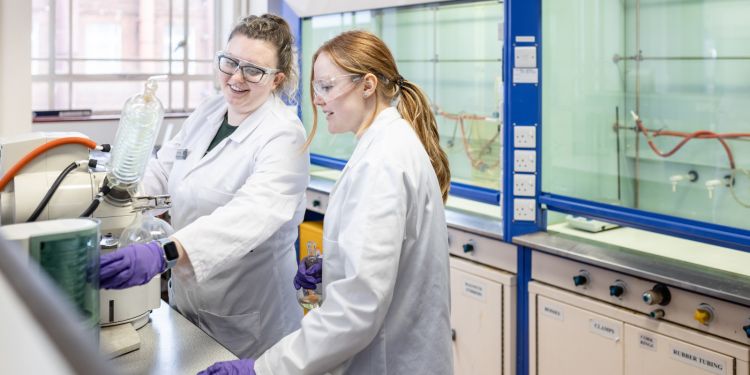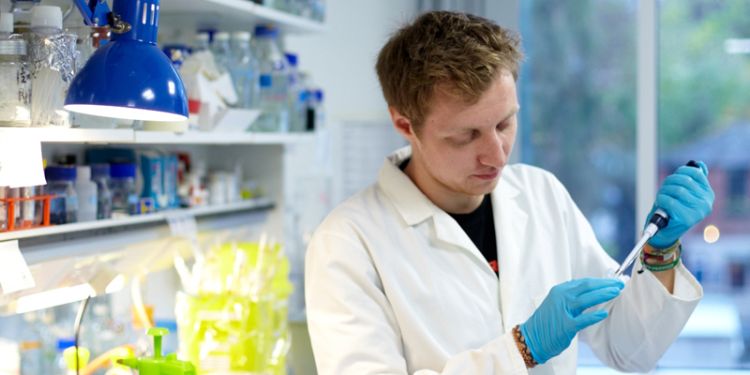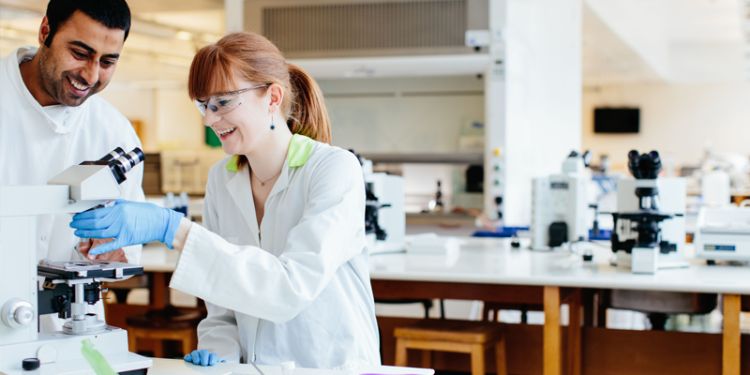Natural Sciences facilities

We have an active research environment which enables us to offer exciting courses taught by experts who are leaders in their fields. Our Natural Sciences BSc/MNatSc is very flexible, designed to allow you to study the 3 sciences that most interest you at University-level. You’ll be directly engaged in research through project work and dependent on the modules you take, you will have access to teaching facilities from across the different schools and faculties.
We have all the facilities you’ll need to support and enhance your academic studies. We are continually investing in the best facilities to provide a creative and stimulating learning environment. You will find everything you need for your studies right here on campus.
School of Chemistry
Our academics and postgraduate researchers have access to a wide range of specialist facilities and laboratories and you may benefit from these facilities during your project work. Our specialist facilities include the latest equipment for synthetic, physical and analytical chemistry, 500 MHz NMR machines, a cutting-edge CCD-based X-ray diffractometer, scanning electron microscopes and a purification laboratory.
There are two undergraduate teaching laboratories in the School of Chemistry: the Joseph Priestley laboratory where you will perform synthetic and analytical chemistry, and the Porter laboratory where you will perform your physical chemistry experiments.

Find out more about the teaching facilities at the School of Chemistry.
School of Mathematics
The School of Mathematics is home to study areas and computer clusters, including a dedicated workspace for postgraduate students. You will have access to state-of-the-art lecture theatres seat over 200 people and are equipped with the latest audio-visual technology and professional presentation technology, whilst our impressive seminar and syndicate rooms offer a less formal environment for group work and meetings.
Find out more about the teaching facilities at the School of Mathematics.
School of Physics and Astronomy
You'll be based in the Sir William Henry Bragg Building – an impressive development bringing together our friendly, supportive and diverse community of students, researchers and academics to collaborate in the same modern space.
Our laboratories used by undergraduate and Masters students are equipped with the latest technology for practical, hands-on learning. This hands-on approach features across our Physics and Physics and Astronomy courses. Astrophysics students have access to our observatory, situated at the top of the Sir William Henry Bragg building. This purpose-built facility includes two 35cm telescopes, complete with sensitive CCD detectors capable of multi-wavelength imaging.

Find out more about the teaching facilities at the School of Physics and Astronomy.
School of Earth and Environment
The School of Earth and Environment, situated in the heart of campus, is home to one of the UK’s largest groupings of Earth, environmental and social scientists. During your studies, you will have access to specialist laboratories and facilities relevant to your degree. Students studying environmental science will spend time in our Earth Visualisation Laboratory – a 96-capacity teaching laboratory that offers and immersive and collaborative learning atmosphere. The laboratory is also home to 85 polarising microscopes for rock analysis, a number of binocular stereo zoom microscopes for micropalaeontology and ore genesis work and the extra-deep desks are suitable for laying out large geological maps for teaching 3D thinking skills.

Find out more about the teaching facilities at the School of Earth and Environment.
School of Food Science and Nutrition
The School is situated in the heart of the campus. You will have access to excellent teaching and laboratory facilities, supplemented by extensive computing equipment. The School is well equipped with state-of-the art facilities, including several refurbished laboratories, with cell culture facilities in a temperature and environment controlled room, excellent HPLC and GC analytics (together with triple quadropole mass spectrometer, fluorescence, diode array and coularray detectors), and a sophisticated Akta protein purification set-up.
You will also benefit from our integrated style of learning and teaching. Laboratory classes, project work, lectures and seminars allow you to gain hands-on experience investigating and applying material from your lectures and tutorials to real life work situations.

Find out more about the teaching facilities at the School of Food Science and Nutrition.
School of Biology
The School of Biology delivers the whole organism Biology programmes within the Faculty of Biological Sciences. This delivery ranges from molecular to population scales, includes animals, plants, and fungi, and involves fundamental basic biology through to applied research with considerable societal impact.
The Faculty of Biological Sciences has a number of research facilities which are open to all researchers at the University of Leeds, other academic institutions, and industry. Their purpose is to support world-class research and cover the broad research themes of biophysical characterisation, structural elucidation and cellular visualisation. You may benefit from these facilities during your project work.

Find out more about the School of Biology.
School of Molecular and Cellular Biology
Molecular and Cellular Biology is a very broad, fast moving and diverse area. This is reflected in the programmes that cover the fundamental processes involved in human health and disease, and are underpinned by state-of-the-art facilities in methods such as protein production, electron microscopy, super-resolution light microscopy, NMR spectroscopy and molecular biophysics, supported by expert facility managers and technical support staff.
The School is also home to key members of the Astbury Centre for Structural Molecular Biology and LeedsOmics. These interdisciplinary groupings bring together scientists from the physical, biological and medical sciences in Leeds to tackle major scientific challenges.
You’ll be directly engaged in research through project work and may benefit from these specialist facilities.

Find out more about the School of Molecular and Cellular Biology.
Interdisciplinary Research Centres
Interdisciplinary research is the future which is why at Leeds, we have founded several international centres where scientists can collaborate and use the best ideas and methods to give new insight into the natural world:
-
The Astbury Centre for Structural Molecular Biology is known internationally for its work to understand life in molecular detail by using the latest state-of-the-art facilities in life and physical sciences.
-
The Priestley International Centre for Climate is unique in bringing together world-leading expertise in all the key strands of climate change research.
-
The Leeds Institute for Data Analytics (LIDA) brings together applied research groups and data scientists from all disciplines, opening up new opportunities to understand science underpinned by large and complex data sets.
-
The Bragg Centre for Materials Research brings together scientists and engineers across a wide range of disciplines to work in the development of novel materials to address scientific challenges.
Our approach to interdisciplinary research feeds into our teaching. Whether you want to understand more about how to combine physics and maths to study the quantum world, model the growth of biological populations or understand biochemistry at the atomic level, we have the experts to guide you in your final year project.
University facilities
- Academic facilities including libraries, computers and IT.
- Facilities around our single-site campus, which is just a short walk from the centre of Leeds.
- Explore more of our facilities through our 360 virtual experience.


